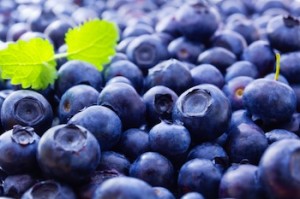Study: Blueberries help reduce Parkinson’s risk
A new study shows eating blueberries reduces the risk of contracting Parkinson’s disease and may protect human brain performance.
A group of scientists from North Carolina State University, Purdue University and Rutgers University investigated how extracts from blueberries, grape seeds, hibiscus, blackcurrant and Chinese mulberries, all of which are rich in health-promoting phytochemicals, could suppress cell death caused by Parkinson’s, according to a news release.
The study, “Neuroprotective effects of anthocyanin- and proanthocyanidin-rich extracts in cellular models of Parkinson’s disease,” was published in the March 25 issue of the Brain Research scientific journal.
Findings indicate two specific classes of phytochemicals are effective against the neurodegeneration or loss of nerve cell function in the brain brought on by Parkinson’s, according to the release.
Anthocyanins and proanthocyanidins are naturally occurring plant compounds prevalent in some fruits and vegetables.
“Blueberries have both of these natural chemicals in high concentrations, so they pack a more powerful, 1-2 punch,” researcher Mary Ann Lila, director of North Carolina State University’s Plants for Human Health Institute in Kannapolis, N.C., said in the release. “They can have synergistic benefits that surpass many other fruits when it comes to protection against brain cell death, which in turn may reduce the risk of contracting Parkinson’s.”
In the U.S., 1 million people are estimated to suffer from Parkinson’s, a degenerative disorder of the central nervous system that involves the malfunction and death of vital brain nerve cells. The disease leaves people unable to control movement normally.
Early symptoms include shaking, stiffness, slowed movement and difficulty walking, according to the release.
The Packer






